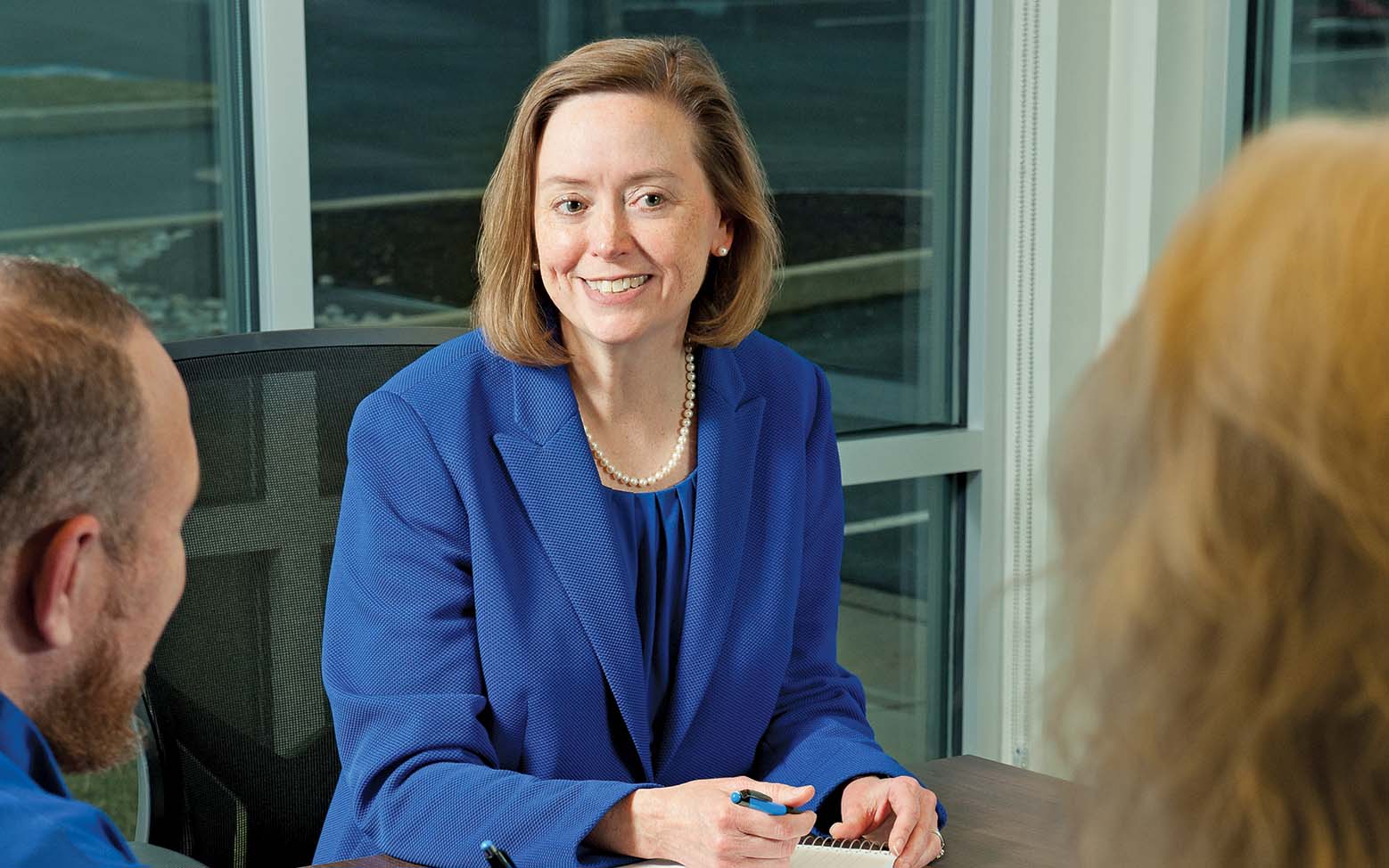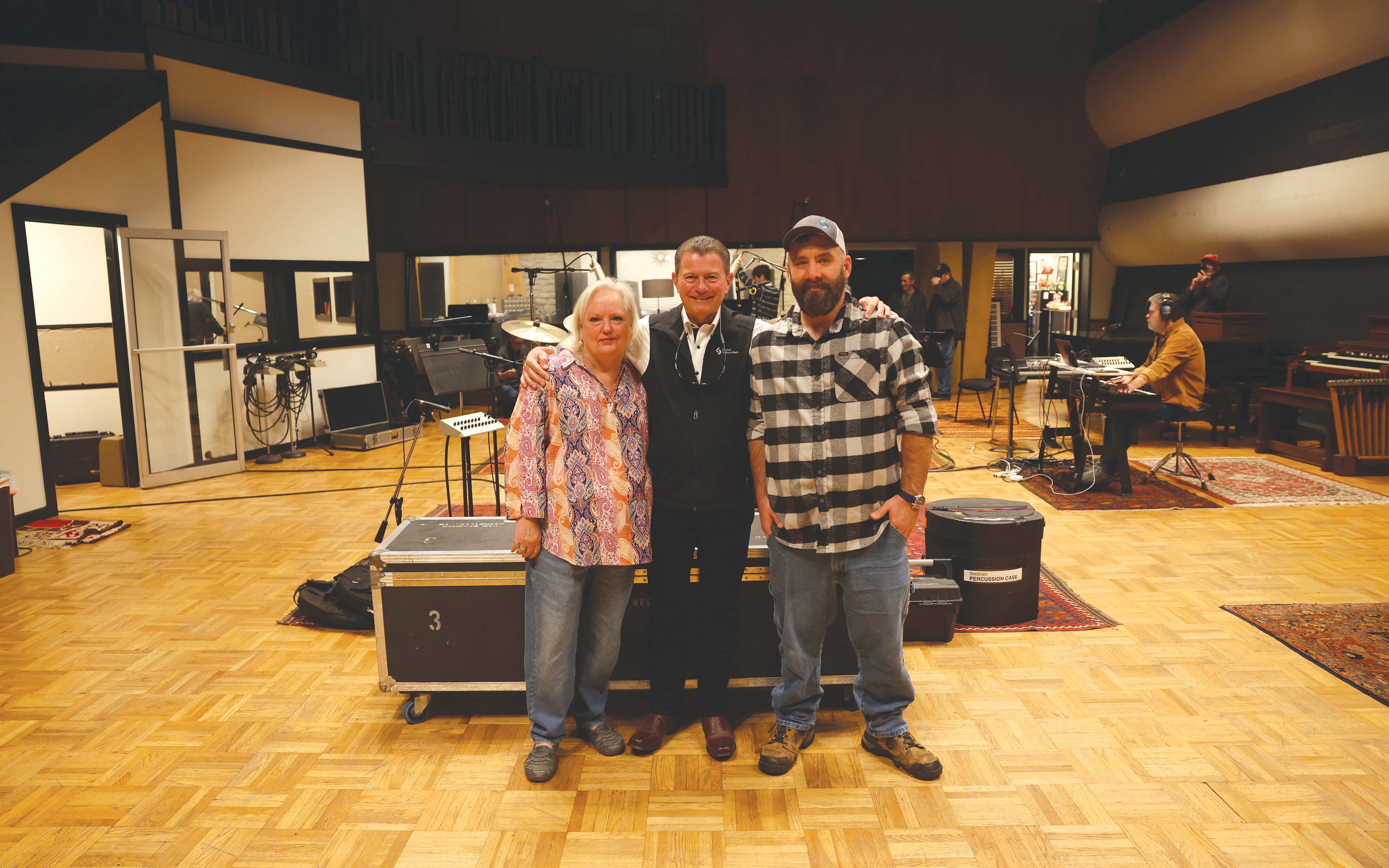ICBA’s 2019 National Community Bank Service Award winners didn’t blink when their communities faced challenges. Whether they’re helping their community recover from devastating forest fires, investing in first responders or even spreading financial education, these community banks are rolling up their sleeves and improving their communities.
Meet the winners of ICBA’s 2019 National Community Bank Service Awards
0919 Service Awards Golden Valley Bank Team 2k
September 01, 2019 / By ICBA
ICBA’s 2019 National Community Bank Service Award winners didn’t blink when their communities faced challenges. Whether they’re helping their community recover from devastating forest fires, investing in first responders or even spreading financial education, these community banks are rolling up their sleeves and improving their communities.
ICBA’s 2019 National Community Bank Service Award winners didn’t blink when their communities faced challenges. Whether they’re helping their community recover from devastating forest fires, investing in first responders or even spreading financial education, these community banks are rolling up their sleeves and improving their communities.
Grand National Winner
Finding the strength to rebuild
On the morning of Nov. 8, 2018, Mark Francis, the president and CEO of $350 million-asset Golden Valley Bank in Chico, Calif., had just finished a breakfast meeting downtown when he noticed a large, dark cloud overhead.
“I thought to myself, ‘Wow, I didn’t know it was going to rain today,’” he recalls. “Then it just kept getting bigger and bigger.”
Before long, news reached the community bank’s Chico branch that a fire was heading toward the town of Paradise, just 15 miles away. Staff gathered in the hallways, trying to figure out how bad it was. Employees who were Paradise residents tried to get home, unsuccessfully. They knew that Paradise was in an area vulnerable to forest fires. Just a decade prior, a fire had taken out a number of homes near the town. At first, the prevailing feeling was disbelief. But within a few hours, they knew there was a big problem.

Natasha Beehner, Golden Valley Bank’s associate vice president and marketing manager, remembers seeing a photograph of Paradise’s entry sign burned to the ground. “The fire had started so far away from that [sign], so seeing that was when we all realized there was potential for Paradise to be gone after this, which ultimately was what happened,” she says.
In fact, the Camp Fire, as it came to be known, became the most destructive wildfire in California’s history. The blaze burned 153,000 acres, including the communities of Paradise, Concow and Magalia, and destroyed 18,800 structures, including 14,000 homes, with insurance claims totaling $8.4 billion. The fire killed 86 people.
Responding to disaster
Laurie Kee, a vice president and relationship banking manager at Golden Valley Bank, remembers being at a meeting 30 miles away and not being able to get back to the office. “I had to turn around in the middle of the highway,” she recalls, “because people were trying to get out.”
“By later that afternoon, it was like night here,” Francis says. “You had to drive with your lights on. I remember the parking lot lights coming on, and the lights around our building. It was so dark; it was like night. It was that way for a few days.”
Marketing officer Jaci Phelps describes the prevailing feeling in the community as “devastation, disbelief and, for a long time, shock.” “People really didn’t understand that things were just gone, and how many people were impacted, even though you could see it,” she says. “It took a long time for people to truly believe it had happened.”
The air was so dense and toxic that one of Golden Valley Bank’s customers brought in hundreds of face masks to distribute to employees and customers, and the bank stayed open out of normal hours to answer calls and help the 30,000 people evacuating Paradise to get funds.
The day after the fire began, the bank went one step further. It donated $50,000 to the Golden Valley Bank Community Foundation with the hope that the rest of the community would follow suit. The team reached out to local partners, asking them to contribute and to ask everyone they knew to contribute, too. They charged no administration fees, allowing 100% of donations to go straight to fire relief. Before long, they had 40 partners on board, and the response surpassed their wildest expectations.
“In a normal year, we would raise $300,000,” Beehner says. “Then all of a sudden, in a couple of hours, we had $300,000. And it just kept building and building. Everyone wanted to do, to act, to give.”
The foundation’s efforts were mentioned in news reports on CNN and MSNBC. “Our PayPal account would just light up whenever we got mentioned,” Francis remembers. “We got literally thousands and thousands and thousands of contributions from around the country and even some internationally. It was just incredible.
“We had five employees and two directors lose their homes,” he adds. “They didn’t know what to do, because they’d just lost everything. But what was happening with the foundation was uplifting for the entire staff. Every one of us knows many, many people who lost their homes up there, and this helped rally us at the bank.”
“You don’t expect this kind of tragedy to happen, and when it does, you’ve got to act. And community banks are in a position to do that.”
—Mark Francis, Golden Valley Bank
The road to recovery
To date, the Golden Valley Bank Community Foundation has raised $13 million and distributed $4 million to survivors, nonprofits and other agencies for direct relief and dozens of local projects. The money raised has been placed in a special money market account that pays 2% interest, and recipients of insurance money have been offered the same rate while they wait to rebuild.
Bank employees have dedicated hundreds—possibly thousands—of hours to fundraising, accounting and awarding grants since the fire. Three were put on full-time fire relief for three months: Kee as Camp Fire coordinator, and Beehner and Phelps as donation managers.
Initially, funds went directly to victims, covering immediate needs like gas, food and shelter. Once those needs became less acute, Golden Valley Bank started funding organizations like homeless shelters, Meals on Wheels and the local Boys & Girls Club. It helped an RV park get up and running on a church property, contributed to a Salvation Army mobile emergency disaster kitchen and subsidized the relocation of local two schools, Paradise Elementary and Achieve Charter.
More recently, the bank has funded scholarships for graduating Paradise High School students (specifically those who have relocated to Chico due to the Camp Fire) and a one-year salary for a disaster recovery director for the town of Paradise.
“When you come to work in the morning and everything’s fine, and before lunch you’ve lost everything, it’s hard to even imagine,” Francis says. “You don’t expect this kind of tragedy to happen, and when it does, you’ve got to act. And community banks are in a position to do that.”
The team at Golden Valley Bank is aware that recovery will take decades and that their efforts will need to continue for as many years. But it’s a task they are willing to see through.
“If you were able to see the before and after, it’s just devastating,” Kee says. “It will never be what it was, but you’ve got a group that is very determined to bring Paradise back.”
National Winner
Helping those who help others
In July 2018, the Conemaugh Township Volunteer Fire Department in Tire Hill, Pa., began searching the Quemahoning Reservoir for a missing teenager. As the days stretched on and the heat index rose, the fire department quickly ran out of supplies to hydrate and feed its volunteers. That’s when Somerset Trust Company got involved. Employees of the $1.3 billion-asset community bank in Somerset, Pa., joined together and purchased water and snacks to restock their supplies on three separate days.
This is but one of countless examples of how Somerset Trust Company has provided support to fire departments and other first responders for nearly two decades.
“I have been a volunteer firefighter myself for many years, and it is my belief that first responders are the backbone of every community in our footprint,” says G. Henry Cook, the community bank’s CEO and chairman of the board. “When the tragedy of Sept. 11 occurred, and part of it was in our backyard, it made all of America aware of the importance of our first responders. We are humbled by the commitment and dedication these volunteers give to their neighbors, which is why a vital part of our mission is to support their efforts in any we can as a community bank.”

Cook leads by example, and his faith in first responders has translated to action at the bank. “Mr. Cook is still a devoted lifetime member of the Somerset Volunteer Fire Department Station 601,” says Danielle Stahl-Maurer, assistant vice president and marketing officer at Somerset Trust Company. “At times, he even leaves work to race to the scene of a fire call. His firsthand experience of fulfillment and struggle involved in local fire service inspired Somerset Trust to champion volunteer fire departments and first responders.”
The community bank’s commitment began out of a tragedy close to home. “With the tragic events of Sept. 11, 2001, and the crash of United Flight 93, Somerset County became a major part of history,” Stahl-Maurer says. “Many bank employees arrived at the site within hours as volunteer first responders.”
Then, when the families met to discuss a national monument to Flight 93, the bank opened its historic building for their meetings. The community bank served as a depository for public donations to support the memorial, in addition to donating $100,000 to the efforts. Somerset Trust Company continues to support the memorial in numerous ways, including an annual donation. “Many of our employees remain members of the Friends of Flight 93, and each spring, they volunteer to ‘Plant a Tree at Flight 93,’ a reforestation effort that will result in 150,000 new trees at the National Memorial,” Stahl-Maurer says.
Keeping rural communities safe
According to the United States Fire Administration’s most recent study, 97% of registered fire departments in Pennsylvania are completely or mostly staffed by volunteers. “Most of the volunteer fire departments in our footprint are located in rural areas, and many are in desperate need of volunteers and funds to provide this essential service to their communities,” she says. Annually, Somerset Trust Company makes donations totaling more than $35,000 to 60 local volunteer fire departments in its area.
In fact, the bank’s dedication to volunteer fire departments has spread throughout all levels of the organization. More than half of its employees are actively involved in one or more first responder initiatives.
In addition to annual donations, the bank sponsors firework displays for many fire departments, and dozens of employees volunteer their time working, collecting admissions and calculating deposits for the fire departments when they hold community events. Somerset Trust Company hosts annual appreciation dinners for first responders, serving dinner to more than 300 people each year. The bank sponsors First Responders Night at the local speedway and provides about 5,000 free tickets to first responders and their families for the event.
Since 2013, Somerset Trust has approved more than $7.4 million in financing for volunteer fire departments in the communities it serves. “Typically, we offer a special loan rate reserved for nonprofit entities,” Stahl-Maurer says.
What more could the community bank do? “We are currently researching what additional account benefits we can offer our first responders, such as specially branded checks and/or debit cards, as well as other potential benefits such as reduced fees or free services,” she adds.
Stahl-Maurer sums up Somerset Trust’s commitment: “The support of local volunteer fire departments is one of the most vital and prevalent needs in the rural communities served by our bank.”
National Winner
Lifting Kentucky out of the financial doldrums
Sometimes it takes dire news to bring about change. That was certainly the case when the team at $1.2 billion-asset Community Financial Services Bank (CFSB) in Benton, Ky., saw the results of a national report card on financial literacy. Their home state received the nearly failing grade of D+. At the same time, Kentucky was ranked 47th in the nation for people falling below the poverty line. And, worse still, the First Congressional District, CFSB’s backyard, came in even lower than the rest of the state. This meant that the bank served one of the poorest and least financially literate districts in the country.
A group of young community bankers decided to do something about it. They decided that community banks should take up the mantle and become a driving force for change.

“We have a fairly young team,” says Cody Myers, CFSB’s trust officer, who was instrumental in setting up the community bank’s financial literacy program. “Many of us are in the wealth-building stage of life and still have several different financial milestones we’d like to hit. We found that we weren’t the only ones that were interested in really digging in and finding out what financial literacy should look like.”
Coaches in training
In January 2017, CFSB started sending team members to a financial coaching program offered by Ramsey Solutions in Nashville, Tenn. To date, 14 have become certified financial coaches, returning to their branches to train other team members, as well as families, teachers, students and other community members, in the basics of money management. During banking hours and on their own time, the coaches have partnered with various groups within the community, from churches to large employers, to offer financial wellness services.
“If you’re working somewhere and spending every moment of the day thinking about how you’re going to make your mortgage payment, you’re not a very productive employee,” Myers explains. “There’s a great stake in this for our large employers. Their productivity skyrockets, and they become overall much healthier organizations.”
“You can start to see why it would make sense for a bank to spend money to help people get out of debt because it changes the economic tide.”
—Cody Myers, Community Financial Services Bank
Knowing that 14 coaches couldn’t keep pace with the need within the community, CFSB decided to earmark funds each year to sponsor a financial literacy curriculum at 23 local middle and high schools.
Then in 2017, the team went further still, partnering with the Kentucky Financial Literacy Initiative in supporting House Bill 132, which would incorporate financial literacy principles into state-mandated graduation requirements. The bill passed overwhelmingly through Kentucky’s House and Senate, and the governor signed it into law in April 2018. The mandate starts in the 2020–21 school year.
Myers hopes that, by the time students graduate from high school, the lessons will start to sink in. After that, graduates can draw upon the community bank’s expertise through one-on-one coaching and small group meetings. If they are then employed locally, the bank could partner with their employers on financial wellness in the workplace. The goal is that graduates will then start more local businesses, build wealth and support nonprofits instead of giving all their money to student loan and credit card companies.
“That totally changes our community,” Myers says. “It changes our economy and, over time, it reverses multigenerational poverty, replacing it with multigenerational wealth. You can start to see why it would make sense for a bank to spend money to help people get out of debt, because it changes the economic tide.”
Continuing support
It’s a change he’s already seeing. The CFSB team often attends college freshman orientation sessions where it advises students on best practices for budgeting and financial aid.
“We’ve had people who’ve gone straight from our sessions to the financial counsellor and said, ‘Cut the loan in half. I don’t need everything I borrowed’,” Myers reports. “Those are my favorite stories, because I know that’s something that my friends have dealt with and something we dealt with in my family. It makes a huge difference.”
With the community bank’s initiatives and the passing of legislation, the team is hoping that financial literacy will spread throughout Kentucky. Myers adds: “Hopefully, this will take us from being one of the least financially literate states in the union, all the way up, much closer to the top.”
2019 Honorable Mentions
Seven other community banks received recognition for outstanding service to their communities.
In Yuma, Ariz., $343 million-asset 1st Bank Yuma takes financial literacy to the next level with the Kinder to College Financial Initiative. A hybrid of web-based instruction and banker lectures, the program is divided into four components, each targeting different age levels, to help students bridge the gap between school and the real world.
In Monett, Mo., employees at $172 million-asset First State Bank of Purdy spearheaded the revitalization of its rural community’s declining downtown. Today, the remodeled area has a park and outdoor events pavilion, which hosts First on Front, a gathering featuring music, food trucks and local businesses.
In Lafayette, La., $2.2 billion-asset Home Bank brought new life to Thrive Academy, an independent boarding school serving at-risk youth. When other banks declined to finance the school’s construction of student dorms in 2015, Home Bank stepped in. In funding the loan, employees remained involved by teaching monthly financial literacy classes.
In Mankato, Minn., $381 million-asset Profinium, Inc. tackles the needs of its community one person at a time with the Achieving Dreams Together program. Every holiday season, the bank takes nominations from the community for those who could use extra cheer. Recipients included a mother with terminal cancer who wanted to go to Paris with her family, and a child in need of hearing aids.
In Elroy, Wis., employees of $441 million-asset Royal Bank helped the 2018 flood relief efforts in southwest Wisconsin. With many homes damaged, community bank employees assisted by moving furniture, fixing drywall and insulating homes. The bank continued to be engaged, funding flood relief loans and contributing nearly $45,000 in donations, as well as $234,600 in grants.

In Olney, Md., $8.3 billion-asset Sandy Spring Bank celebrated its 150th anniversary by launching the Sandy Spring Bank Foundation to bring change to the community. It started with a $50,000 donation to nonprofits in the area. Next, the bank planted 150 trees in the Washington, D.C., region. Then it challenged employees to each log 50 volunteer hours for a total of 50,000 hours in 2018.
And in Atmore, Ala., $671 million-asset United Bank established on-site tax preparation for the Volunteer Income Tax Assistance Program through the IRS. With this program, the community bank provides free federal and state tax filing assistance to those who need it. —Rebecca Lubecki
William Atkinson is a writer in Illinois. Roshan McArthur is a writer in California.
Subscribe now
Sign up for the Independent Banker newsletter to receive twice-monthly emails about new issues and must-read content you might have missed.
Sponsored Content
Featured Webinars
Join ICBA Community
Interested in discussing this and other topics? Network with and learn from your peers with the app designed for community bankers.
Subscribe Today
Sign up for Independent Banker eNews to receive twice-monthly emails that alert you when a new issue drops and highlight must-read content you might have missed.
News Watch Today

Join the Conversation with ICBA Community
ICBA Community is an online platform led by community bankers to foster connections, collaborations, and discussions on industry news, best practices, and regulations, while promoting networking, mentorship, and member feedback to guide future initiatives.












